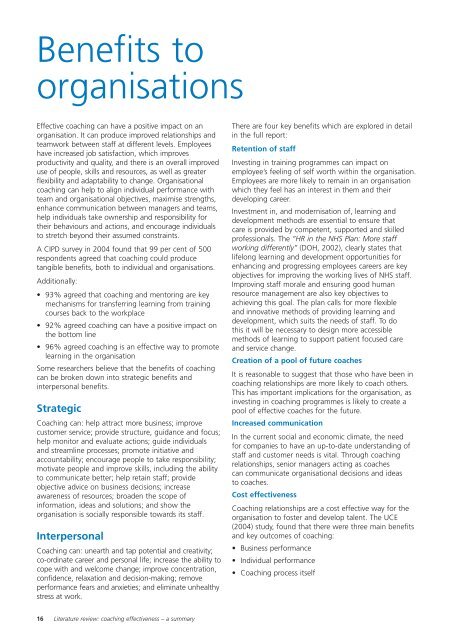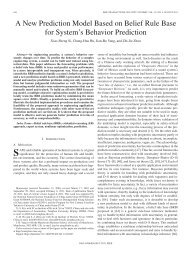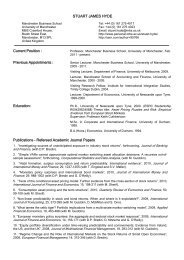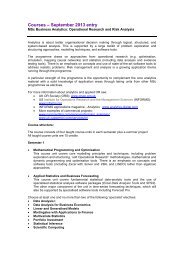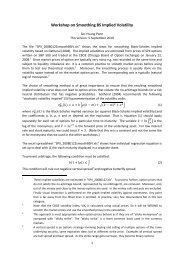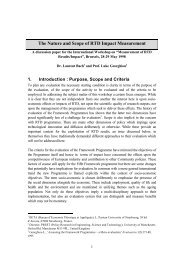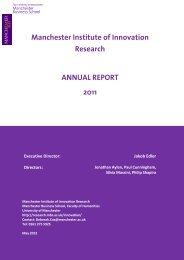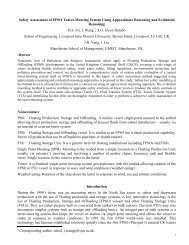Literature review: coaching effectiveness â a summary
Literature review: coaching effectiveness â a summary
Literature review: coaching effectiveness â a summary
You also want an ePaper? Increase the reach of your titles
YUMPU automatically turns print PDFs into web optimized ePapers that Google loves.
Benefits to<br />
organisations<br />
Effective <strong>coaching</strong> can have a positive impact on an<br />
organisation. It can produce improved relationships and<br />
teamwork between staff at different levels. Employees<br />
have increased job satisfaction, which improves<br />
productivity and quality, and there is an overall improved<br />
use of people, skills and resources, as well as greater<br />
flexibility and adaptability to change. Organisational<br />
<strong>coaching</strong> can help to align individual performance with<br />
team and organisational objectives, maximise strengths,<br />
enhance communication between managers and teams,<br />
help individuals take ownership and responsibility for<br />
their behaviours and actions, and encourage individuals<br />
to stretch beyond their assumed constraints.<br />
A CIPD survey in 2004 found that 99 per cent of 500<br />
respondents agreed that <strong>coaching</strong> could produce<br />
tangible benefits, both to individual and organisations.<br />
Additionally:<br />
• 93% agreed that <strong>coaching</strong> and mentoring are key<br />
mechanisms for transferring learning from training<br />
courses back to the workplace<br />
• 92% agreed <strong>coaching</strong> can have a positive impact on<br />
the bottom line<br />
• 96% agreed <strong>coaching</strong> is an effective way to promote<br />
learning in the organisation<br />
Some researchers believe that the benefits of <strong>coaching</strong><br />
can be broken down into strategic benefits and<br />
interpersonal benefits.<br />
Strategic<br />
Coaching can: help attract more business; improve<br />
customer service; provide structure, guidance and focus;<br />
help monitor and evaluate actions; guide individuals<br />
and streamline processes; promote initiative and<br />
accountability; encourage people to take responsibility;<br />
motivate people and improve skills, including the ability<br />
to communicate better; help retain staff; provide<br />
objective advice on business decisions; increase<br />
awareness of resources; broaden the scope of<br />
information, ideas and solutions; and show the<br />
organisation is socially responsible towards its staff.<br />
Interpersonal<br />
Coaching can: unearth and tap potential and creativity;<br />
co-ordinate career and personal life; increase the ability to<br />
cope with and welcome change; improve concentration,<br />
confidence, relaxation and decision-making; remove<br />
performance fears and anxieties; and eliminate unhealthy<br />
stress at work.<br />
There are four key benefits which are explored in detail<br />
in the full report:<br />
Retention of staff<br />
Investing in training programmes can impact on<br />
employee’s feeling of self worth within the organisation.<br />
Employees are more likely to remain in an organisation<br />
which they feel has an interest in them and their<br />
developing career.<br />
Investment in, and modernisation of, learning and<br />
development methods are essential to ensure that<br />
care is provided by competent, supported and skilled<br />
professionals. The “HR in the NHS Plan: More staff<br />
working differently” (DOH, 2002), clearly states that<br />
lifelong learning and development opportunities for<br />
enhancing and progressing employees careers are key<br />
objectives for improving the working lives of NHS staff.<br />
Improving staff morale and ensuring good human<br />
resource management are also key objectives to<br />
achieving this goal. The plan calls for more flexible<br />
and innovative methods of providing learning and<br />
development, which suits the needs of staff. To do<br />
this it will be necessary to design more accessible<br />
methods of learning to support patient focused care<br />
and service change.<br />
Creation of a pool of future coaches<br />
It is reasonable to suggest that those who have been in<br />
<strong>coaching</strong> relationships are more likely to coach others.<br />
This has important implications for the organisation, as<br />
investing in <strong>coaching</strong> programmes is likely to create a<br />
pool of effective coaches for the future.<br />
Increased communication<br />
In the current social and economic climate, the need<br />
for companies to have an up-to-date understanding of<br />
staff and customer needs is vital. Through <strong>coaching</strong><br />
relationships, senior managers acting as coaches<br />
can communicate organisational decisions and ideas<br />
to coaches.<br />
Cost <strong>effectiveness</strong><br />
Coaching relationships are a cost effective way for the<br />
organisation to foster and develop talent. The UCE<br />
(2004) study, found that there were three main benefits<br />
and key outcomes of <strong>coaching</strong>:<br />
• Business performance<br />
• Individual performance<br />
• Coaching process itself<br />
16 <strong>Literature</strong> <strong>review</strong>: <strong>coaching</strong> <strong>effectiveness</strong> – a <strong>summary</strong>


